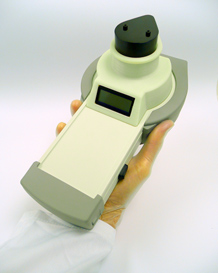
Hand-held malaria diagnosis device
University of Exeter receives additional Grand Challenges Explorations funding
The University of Exeter announced today that it will receive additional funding through Grand Challenges Explorations, an initiative created by the Bill & Melinda Gates Foundation that enables researchers worldwide to test unorthodox ideas that address persistent health and development challenges.
Professor Dave Newman will continue to pursue an innovative global health research project, titled Novel Magneto-Optical Biosensors for Malaria Diagnosis.
Grand Challenges Explorations funds scientists and researchers worldwide to explore ideas that can break the mould in how we solve persistent global health and development challenges. Professor Dave Newman’s project is one of 12 Grand Challenges Explorations Phase II grants announced today.
“Finding solutions to persistent global health problems is a difficult, lengthy and expensive process. GCE was designed to tap the innovators of the world by providing resources needed to explore bold ideas that are typically too risky to attract funding through other mechanisms,” said Chris Wilson, director of Global Health Discovery at the Bill & Melinda Gates Foundation. “We’re excited to enable further development of novel approaches that can prevent or lessen the burden of diseases that kill or disable millions of the world’s most vulnerable.”
Projects that are receiving additional funding show promise in tackling priority global health issues where solutions do not yet exist. This includes finding effective methods to eliminate or control infectious diseases such as malaria and HIV.
Professor Dave Newman is leading a team of University of Exeter engineers in a program to develop a handheld, inexpensive battery-powered instrument that can rapidly diagnose malaria. The instrument uses magneto-optics to detect the hemozoin crystals produced as a by-product of malaria parasite digestion of haemoglobin in the red blood cell. The technique also has the potential to avoid the need for invasive blood sampling.
The project’s first phase produced a compact hand-held device able to diagnose malaria under laboratory conditions. In Phase II, simpler and more robust devices will undergo development and clinical testing in field conditions in Thailand and Kenya.
The Exeter team will also attempt to develop a fully non-invasive diagnostic device, based on the same principle.
Professor Dave Newman said: “There is an urgent need for a new diagnostic technique for malaria, particularly in the light of global warming, which threatens to spread the disease into new parts of the world, including southern Europe. The early results from our device are very promising and hugely exciting. We expect to ultimately produce a sensitive non-invasive device that will be cost effective and easy to use, making it suitable for developing countries, where the need is greatest.”
About Grand Challenges Explorations
Grand Challenges Explorations is a US$100 million initiative funded by the Bill & Melinda Gates Foundation. Launched in 2008, Grand Challenge Explorations grants have already been awarded to nearly 500 researchers from over 40 countries. The grant programme is open to anyone from any discipline and from any organization. The initiative uses an agile, accelerated grant-making process with short two-page online applications and no preliminary data required. Initial grants of $100,000 are awarded two times a year. Successful projects have the opportunity to receive a follow-on grant of up to US$1 million.
Date: 13 July 2011
